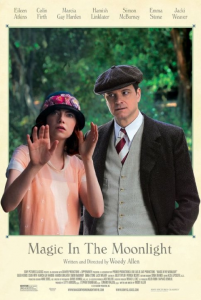film review: magic in the moonlight
A worldly, intellectual and cynical man (Colin Firth as Stanley Taplinger) somewhere in his forties meets a twenty-something, relatively uneducated and ridiculously attractive woman (Emma Stone as Sophie Baker). A battle of so-called wits ensues; this time, the topic is mysticism versus realism. And despite their best efforts, the two main characters are inextricably drawn together — which is amazing since the lack of chemistry is palpable. This makes sense, we’re told, because deep down what most clever young women want in a prospective boyfriend/husband is someone so completely full of himself he probably enjoys the smell of his own farts. Welcome to Woody Allen’s latest film, Magic in the Moonlight.
Yawn. We’ve all seen this before. Even if I could ignore what the tabloids and media had said about Woody Allen’s not-so personal life, I would find this movie lecherous and smug. Even the first scene gives good squirm – Colin Firth is kitted out as a world class illusionist… from the Orient. Heads up everyone, dressing up in blackface is considered offensive but making fun of Asians is okay.
Stanley is persuaded by old friend and fellow illusionist Howard (Simon McBurney) to come and observe a clairvoyant, Sophie, who has apparently completely bewitched a rich American family in the Côte d’Azur. Howard plumps up Stanley’s ego, telling him only he will be able to see through her deceptions and Stanley, having proven himself as someone who never misses a chance to show off and prove is superiority by demeaning others, agrees. The duo set off for the French Riviera, where the two leads meet and the aforementioned Allen rom-com formula kicks in.
Woody Allen proved he could write compelling characters, especially female ones, with Blue Jasmine. So why make films that are all ogle, no substance? Beautiful sets that faithfully represent the world of the 1920s and impressive costumes cannot sustain an audience for 98 minutes. Magic in the Moonlight has cast of talented actors, who were clearly trying to make the most of a rushed script that couldn’t be bothered to properly explore its own concepts and ideas. Intelligence was passed off as the recitation of smarter people’s writings (hey, I can regurgitate Nietzsche on command, can I join the smug intellectual club too?) and the audience was left scratching their heads as to why this film was made. I could see Emma Stone trying mightily to muster up the passion needed for this role to be convincing, but unfortunately there was nothing in the script for her to work with. The film consists largely of a repetitive recitation of old arguments concerning logic and spirituality; on top of that Stanley Taplinger is a boring narcissist.
Australia’s Jacki Weaver was fantastic (as she always is) playing the role of Grace, a woman who just lost her husband and wants desperately to communicate with him through Sophie and believe that he is happy. Grace represents that feeling we’re all familiar with, where reason and logic are all well and good but often leave your heart feeling empty. It was a shame to see the film miss the opportunity to investigate this side of the story.
I wanted desperately to see a film that wasn’t completely boring and offensive, but I defied my own sense of logic by watching this film. In the end, I probably should’ve avoided anything to do with Woody Allen. If what you want is a gorgeous period piece with compelling characters and themes explored subtly and provocatively, watch the BBC version of Pride and Prejudice. Colin Firth also plays an arrogant man in that but Mr Darcy (being a three dimensional character) is way more appealing than anything Magic in the Moonlight has to offer.


